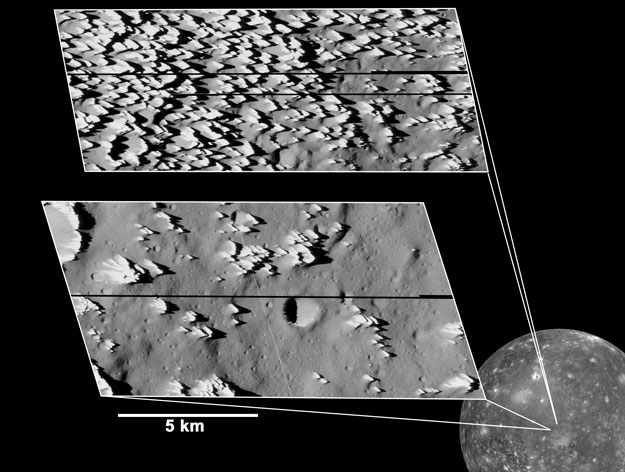
|
Explanation: Why does Jupiter's moon Callisto have unusual jagged hills? This mystery came to light after the robot spacecraft Galileo, in orbit around Jupiter since 1995, swooped past the dark moon in May. The resulting pictures were the highest resolution yet obtained for a Jovian moon: objects as small as 3 meters across are discernable. The strange landscapes pictured above show areas rich in bright sharp mounds about 100 meters tall. A likely formation hypothesis holds that these hills are the result of ejecta thrown billions of years ago during a violent impact. The lower inset region apparently has undergone an epoch of relatively high ice-erosion, where dark rock has filled in some of the inter-hill regions. NASA has recently cleared Galileo to continue swooping Jupiter's moons until 2003, when it will end its journey with a spectacular dive into Jupiter's atmosphere.
|
January February March April May June July August September October November December |
| ||||||||||||||||||||||||||||||||||||||||||||||||
NASA Web Site Statements, Warnings, and Disclaimers
NASA Official: Jay Norris. Specific rights apply.
A service of: LHEA at NASA / GSFC
& Michigan Tech. U.
Based on Astronomy Picture
Of the Day
Publications with keywords: Jupiter - Callisto
Publications with words: Jupiter - Callisto
See also:
- APOD: 2026 January 18 Á Jupiter from the Webb Space Telescope
- APOD: 2026 January 6 Á Jupiters Clouds in High Definition from Juno
- APOD: 2025 November 11 Á Jupiter in Ultraviolet from Hubble
- APOD: 2025 December 14 Á Juno Flyby of Ganymede and Jupiter
- APOD: 2025 September 1 Á Callisto: Dirty Battered Iceball
- APOD: 2025 May 25 Á Beneath Jupiter
- Painting with Jupiter
